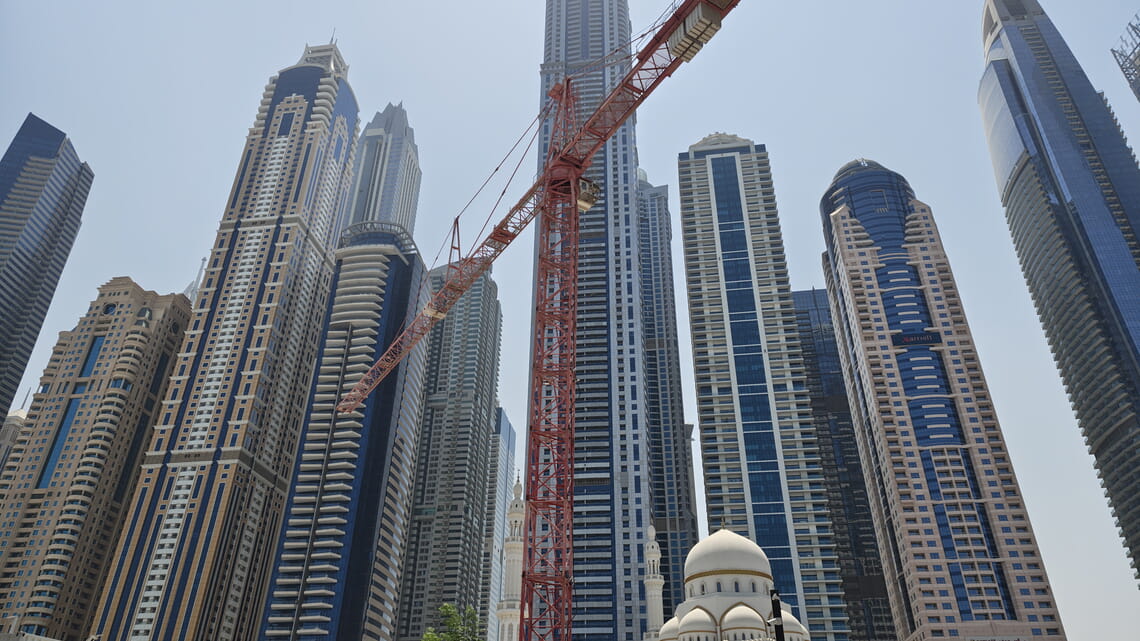- Careers
- Media & Events
- Downloads
-
- Europe
- Belgium
- Germany
- United Kingdom
- France
- Norway
- Austria
- Switzerland
- Czech Republic
- North America
- Canada
- USA
- Middle East & Africa
- United Arab Emirates
- Saudi Arabia

08.09.2025 | News
Introduction – The Challenge
Dubai Harbour’s multi-storey car park project, led by McLaren Construction, required continuous operation of a WOLFF 8060.25 Cross in one of the harshest environments on earth. With summer temperatures soaring to nearly 50°C and dust storms common, traditional diesel generators struggled to deliver reliable peak power. In such conditions, generators lose capacity (known as “de-rating”), and battery-based systems demand heavy cooling through HVAC, leading to parasitic energy losses and frequent maintenance issues.
Normally, the WOLFF 8060.25 Cross would require a 500 kVA diesel generator running 24/7 to support both lifting operations and critical aviation lighting. This setup meant high fuel consumption, significant emissions, a large system footprint, and costly logistics for continuous fuel delivery.
Key Results
| Generator Size Reduced | 500 kVA → 200 kVA (60% reduction) |
| Fuel Savings | 5,700 litres of diesel saved in the first month |
| Emissions Reduction | 15.3 tonnes of CO₂ avoided per month |
| Cost Savings | 3,800 AED per week in fuel, + reduced rental & logistics costs |
| Annual Total Savings | 68,400 litres of diesel and 183 tonnes of CO₂ prevented |
The Solution – Peak Power 200
To address these challenges, we deployed the Peak Power 200 (PP200) flywheel energy storage system. The PP200 stores energy kinetically and instantly releases short bursts of power when demand peaks. This innovation allows cranes and other dynamic equipment to be powered by a much smaller generator without compromising performance.
Unlike batteries, the PP200:
• Features direct air-cooled for the majority of the system including the inverters
• Includes a mini HVAC to create a sealed climate-controlled electrical cabinet
• Operates reliably in extreme heat, making it perfectly suited for Middle Eastern conditions
Implementation – At Dubai Harbour
On-site at Dubai Harbour, the WOLFF 8060.25 Cross was paired with a downsized 200 kVA generator supported by the PP200. This meant that generator capacity was cut by 60% compared to the standard 500 kVA setup. The footprint of the system was significantly reduced, saving space on this busy site.
The system operated continuously without fault. Despite the long operational hours typical of Middle Eastern sites, the PP200 remained stable, efficient, and maintenance-free throughout the summer trial period.
Results – Proven Impact
The introduction of the PP200 delivered impressive savings in just the first month:
• Fuel Savings: Over 5,700 litres of diesel saved
• Emissions Reduction: More than 15.3 tonnes of CO₂ avoided (plus significant NOx and SOx reductions)
• Cost Savings: Approximately 15,300 AED in reduced fuel costs, alongside lower generator rental fees and fewer fuel deliveries
Over the planned 8-month project duration, the system is expected to:
• Save 45,800 litres of diesel
• Prevent 122 tonnes of CO₂ emissions
• Substantially reduce operating costs, ensuring excellent ROI for the project partners
Conclusion – Reliable, Sustainable Power for Harsh Environments
The Peak Power 200 proved its value by enabling a smaller generator to power heavy crane operations around the clock in Dubai’s extreme climate. With 100% uptime on this application and significant economic and environmental benefits, the system showcased its suitability for demanding construction environments worldwide.
WOLFFKRAN extends thanks to the project collaborators who made this success possible: Dumarey Green Power, Byrne Rental for providing temporary power, and the McLaren Construction team, led by Paul O’Rourke, for their leadership in adopting innovative technology.